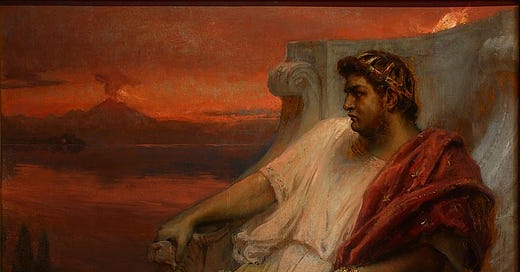Fiddling while Rome burns 🔥
What does this expression MEAN and where does it come from (and why does it feel so intensely pertinent in 2025???)
I’ve always had a vague idea of what this expression means and where it comes from but my lack of actual knowledge finally annoyed me so much that I decided to channel it into something positive i.e. researching it properly and then flinging what I’ve learnt in your direction.
The expression comes from the Roman emperor Nero, who was absolutely UNHINGED. Even if his biographers lied about 80% of his life/life choices, it’s still not looking great. He was accused of everything from murder and incest to doing unspeakable things to animals. But did he ACTUALLY play a set of smooth jazz while Rome was on fire? Maybe. Probably not. But maybe?
In 64 CE, a massive fire was tearing through Rome and the story goes that Nero was so moved he responded as any rational person would. He got into a theatrical costume, hopped on a roof, and started playing some sort of lute. Also he cried a lot. And recited poetry.
Now let’s break down the ancient “evidence.” Firstly, the fiddle had not actually been invented yet so that’s our first issue when it comes to the historical accuracy of this phrase. But that’s the least of our problems. The ancient literature that describes this alleged moment was written at LEAST fifty years after it went down. Tacitus covers the fire and says that Nero DID sing about the fall of Troy but he also opened his palace to refugees and fed them upon arrival. Aw. Suetonius claims that Nero delighted in the beauty of the flames AND slipped on a costume before he put on his own theatrical performance. He also said Nero was singing and possibly playing a lyre (not a fiddle). Cassius Dio cranks it up a notch. Writing 140 years after the fire, he claims that Nero sang in full costume and may have even been responsible for the fire itself???
So, surprise surprise, the ancient sources aren’t super reliable (for something new and different) but where does the fiddle come in??? Would you believe me if I told you we can blame Shakespeare? Well you should because we can. Sort of. Old boy William wrote about this moment in Henry VI, although he specified that Nero was playing the lute. In the early Middle Ages, all string instruments were broadly grouped into the category fidicula, which is where the word fiddle comes from. So somewhere between the composition of Henry VI in 1590 (where it was still a lute) and another play, The Tragedy of Nero, in 1624, the lute was somehow magically transformed into a fiddle. Then in 1649 the playwright George Daniel tattooed the current version of the phrase into our shared cultural consciousness when he wrote “let Nero fiddle out Rome’s obsequies.”
After a quick google of the word obsequies (needlessly fancy way of saying funeral rites), let’s get into what this phrase actually means. Fiddling while Rome burns essentially means doing fuck all while something disastrous is going down. Actually, slightly worse than doing fuck all, the phrase really describes when leaders focus on distractions (or distracting the people) when there are far more urgent matters that need to be dealt with. I’m sure a bevy of impotent politicians or CEOs have popped into your mind so I hope if you were a) familiar with the expression, now you know a bit more about where it actually comes from or b) if you’d never heard it before, you can now confidently add it to your arsenal.
And yes, if you want to be an asshole you can correct people when they use this expression and say that fiddles hadn’t been invented yet. But if you’re using your obscure historical knowledge for a (presumably) metaphorical dick-measuring competition, may I suggest you go outside and reconnect with nature (or email a shrink).
What modern equivalent of fiddling while Rome burns springs to mind?
References
Tacitus. Annals. 15.38-39.
Suetonius. Life of Nero. 38.
Cassius Dio. Roman History. 62.16-18.






Love your posts. Although I have my doctorate in contemporary American Literature, I had nine years of Latin and five of Greek and I did my Masters in that field. I love the way your essays are not only intelligent and learned, but, more important, entertaining and often comic. I think the classics would be studied more if specialists in the field had your welcoming sensibility.
We're living through a "Fiddling while Rome Burns" moment here in the US right now. Over the weekend we had "Golfing with the Saudi Bros while the World's Economy Implodes"...